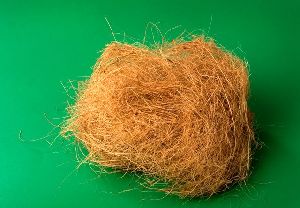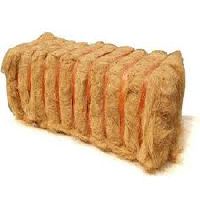
coco fibre
400 Per Ton
25 Metric Ton (MOQ)
Coco peat (coco-peat), also known as coir pith, coir fibre pith, coir dust, or simply coir, is made from coconut husks, which are by-products of other industries that use coconuts. Coir waste from coir fibre industries is washed, heat-treated, screened and graded before being processed into coco peat products of various granularity and denseness, which are then used for horticultural and agricultural applications and as industrial absorbent. Usually shipped in the form of compressed bales, briquettes, slabs or discs, the end user usually expands and aerates the compressed coco peat by the addition of water. A single kilogram of coco peat will expand to 15 litres of moist coco peat. The Advantage of COCO PEAT: The properties of Coco Peat make it resistant to bacterial and fungal growth. Coco Peat holds water rather than shedding it like traditional peat does! It holds 8-9 times its weight in water. Coco Peat has the ability to store and release nutrient to plants for extended periods of time. It also has great oxygenation properties which is important for healthy root development. Enhanced root penetration Coco peat extends the life of compost. Contains natural substances and beneficial microbes for plant growth The coco peat tends to expand in its volume, (i.e..,) Four to five times from its original volume provided. It has a pH of 5.2-6.8 which is neutral to slightly acidic. This makes it great for alkaline garden soils. Easy to use – Just put your compressed Coco Peat brick in a container, add 4 quarts of warm water and let it sit until the water is absorbed, fluff it up and you are ready to use Coco Peat! Coco Peat can be reused for up to 4 years. Coco Peat is very slow to disintegrate; it only begins to break down when it is 10 years old, long term benefits. It is very light and easy to handle. It can be combined with any of the normal ingredients and use as a mixer or a stand-alone product. Weed free, pathogen free, insect free and odourless Excellent medium for growing worms. It’s actually good for them and increases worm growth by 25%. Has high air-filled porosity Much lighter than soil Mixed with sand, compost and fertilizer to make good quality potting soil Environment friendly and non-hazardous How to use coco-peat: The normal use of coco-peat in foreign country are the use of coco-peat block form. Then if we need to expand the whole block later immerse the block in a large tub capable of holding at least 25 litres of water. Remove the wet expanded cocopeat that floats in the water. While continuing to add water to the tub till the complete block is expanded. The cocopeat in the bag are light in weight and easily transported to the nursery area or rain shelter greenhouse. For a large grower who needs to expand large number of cocopeat blocks, place the cocopeat blocks vertically with about 1 ft between them. Spray water from a hose on the cocopeat blocks while working on the blocks with hand to expand them into moist cocopeat. Another method is to use machinery to crush the block into powder and then use the dust. The use of low compression cocopeat for absorption purposes, normally we advise the farmers to simply break and crush the block into powder in the palm of your hand. This method practical for those fragile cocopeat either for locally produced cocopeat or imported cocopeat. The use of cocopeat for potting mix we advise the user to mix the expanded cocopeat with leaf mould or homemade organic manure in the ratio of 1:1. Add red soil or sand in small quantities for large plants, otherwise the cocopeat will not be able to hold the weight of the plants as they grow. Red soil tends to compact over time (despite the cocopeat), so take care not to mix more than one third of the mix. For germination, mix cocopeat, leaf mould and sand in the ratio of 1:1:1. If you are using commercial organic manure, it would be better to mix cocopeat and organic manure in the ratio of 10:1 as commercial organic manures are often of high strength. If the cocopeat are the hydroponics medium, the techniques for hydroponics it is better to thoroughly wash and buffer the cocopeat before use as most of the nutrient formula available on the web are not meant for growing in coir. First expand the cocopeat block as instructed earlier. Wash the expanded cocopeat in a large tub of soft water for a few minutes. Drain the water and repeat the process. If the cocopeat you bought is unwashed, you will have to repeat the process a couple of times more. Dissolve calcium nitrate in water in the ratio of 1 g per litre and allow the cocopeat to soak in the solution for 12 hours. Drain any remaining solution and wash the cocopeat again in soft water a couple of times. The cocopeat is now ready for use as a hydroponics medium. The use of cocopeat replaces the conventional use of topsoil as planting media. More new agriculture technologies are adapted and towards vertical farming system to increase per square meter productivity. The sowing technology today depends on cocopeat and peat moss as efficient and practical medium for seedling preparation.

coco fibre
Get Price Quote
We have the ability to customise the size and dimensions of the grow bag based on client demand. The coir fiber grow bags are ideal for plant substrates for soil less cultivation, largely used greenhouses to grow a variety of vegetables, fruits and flowers. The husk chips used in the coir grow bags are 100% biodegradable. The closed-type bag is ideal to plant cluster of plants for mass cultivation in greenhouses while open-type grow bags are mainly used in small nurseries. The open-type grow bags are designed in such a way to hold one or two cultivations.
Best Deals from Coir Fiber

Coir Fiber
Get Price Quote
We are export coconut coir fiber as per following specifications: 1. Grade -coir fibre 2. Country of origin – india 3. Colour - brown / white(natural) 4. Export mode - hydrolically pressed 5. Moisture - below 15% 6. Impurity - below 5% 7. Fibre length - 5-25 cm 8.packing - hydrollically compressed bale100- 110 kg 9.load ability -20 tons 40ft. Any more detail pleases contact.

Coconut Fiber
Get Price Quote
Yarn, Coir Pith

Coconut Fiber
Get Price Quote
Cocopeat Brick, coconut shell crafts, Cocopeat Blocks, coconut shell crafts

coconut coir
Get Price Quote
coconut coir

Coconut Fibers
Get Price Quote
Coconut Fibers

coconut fibres
Get Price Quote
coconut fibres, Chicken Eggs, Coco Peat, Potatoes, Yam

Coir Fiber
Get Price Quote
Coir Pith, Coir Ropes

Coir Fibre
Get Price Quote
Shrimp, Mixed Vegetable Pickle, flower horn fish

Coir Fibre
Get Price Quote
Dry Fish, School Notebooks

Coconut Coir Fiber
Get Price Quote
Coconut Coir Fiber, Agriculture Products, Coir Products

Coir
Get Price Quote
Jute, honeycomb door, Jute Goods, bag handle, coir foam, Honey Products